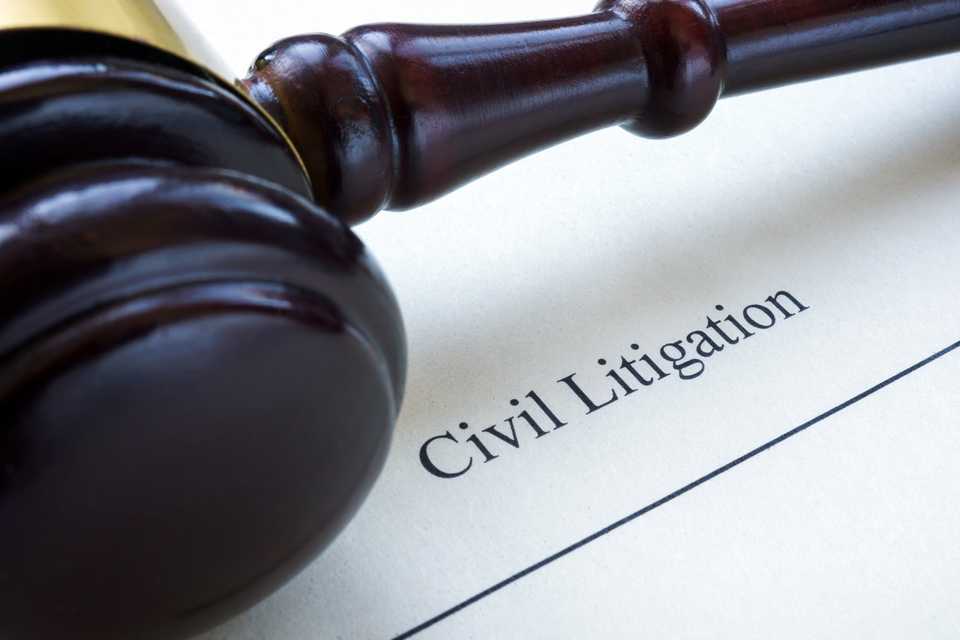Unfair situations and conflicts are an inevitable part of life, affecting everyone at some point. In such instances, pursuing civil action may become necessary to safeguard one’s rights and interests.
Civil litigation is a crucial area of law that addresses disputes between individuals, businesses, or organizations when peaceful resolutions are unattainable. The guidance of a skilled lawyer is often indispensable in navigating these complex issues effectively.
In Toronto, a dynamic hub for legal services, choosing the right civil litigation lawyer can make all the difference in achieving a fair and efficient resolution!

| This article from JuriGo delves into the role of civil litigation lawyers, the services they provide in Toronto, and practical tips for finding the right lawyer to meet your needs! |
|---|
What Is a Civil Litigation Lawyer?
Civil litigation lawyers in Toronto specialize in resolving disputes between private parties through legal avenues such as negotiation, mediation, arbitration, or court proceedings. Their expertise lies in navigating non-criminal conflicts that often involve financial compensation or specific remedies rather than punitive measures.
Unlike criminal lawyers, who address offences against the state, civil litigation lawyers focus on protecting their clients’ rights and advocating for their interests in disputes that may range from contractual disagreements to property issues.
Key Responsibilities of Civil Litigation Lawyers
A civil litigation lawyer’s work begins with a comprehensive understanding of their client’s unique circumstances and legal objectives. This involves analyzing the case, evaluating its strengths and weaknesses, and devising a customized strategy to achieve the most favourable outcome.
These lawyers possess expertise in various areas of law, including:
- Contract Law
- Tort Law
- Property Real Estate Disputes
- Business and Commercial Disputes
- Employment and Workplace Disputes
Civil litigation lawyers play a dual role; representing clients as plaintiffs seeking justice or as defendants protecting their interests. Moreover, civil litigation can be time-consuming, complex, and emotionally taxing. A lawyer not only navigates the legal procedures but also provides invaluable guidance and support, demystifying the process for their clients.
In Toronto, where the legal landscape is both sophisticated and competitive, having a knowledgeable civil litigation lawyer can significantly enhance the chances of success in resolving disputes.
What Services Do Civil Litigation Lawyers Offer in Toronto?
Civil litigation lawyers in Toronto provide a wide array of services tailored to the diverse needs of their clients. Their expertise is particularly valuable in disputes where specialized knowledge of Ontario’s legal framework is essential.
Below is a detailed breakdown of the services these lawyers typically offer:
Drafting and Reviewing Legal Documents
A cornerstone of civil litigation is the preparation and review of legal documents, a meticulous process that lays the groundwork for a successful case. Civil litigation lawyers are responsible for drafting demand letters, statements of claim, defences and other essential pleadings.
These documents must not only articulate the client’s position with clarity and precision but also adhere to the stringent procedural requirements of Ontario’s legal system. A poorly drafted document can lead to delays, procedural dismissals, or even jeopardize the case entirely.

Lawyers carefully refine these materials to present a compelling narrative and substantiate the client’s claims with appropriate legal arguments and evidence. Additionally, their expertise in spotting ambiguities or weaknesses in opposing documents allows them to craft strategies that anticipate potential challenges, ensuring that their clients’ positions are robustly defended.
Pre-Litigation Services
Pre-litigation services are an essential step in resolving disputes before resorting to formal legal proceedings. Civil litigation lawyers play a pivotal role in this phase by drafting and sending demand letters. These documents serve to outline the client’s claims, explain their legal rights, and specify the desired resolution.
The goal is to encourage settlement discussions and demonstrate the seriousness of the case without escalating to court. Demand letters often prompt the opposing party to engage in negotiations, helping to resolve matters efficiently and cost-effectively.
This stage allows clients to explore potential solutions while minimizing legal expenses and preserving professional or personal relationships, making it a strategic and beneficial step in dispute resolution.
Legal Representation in Court
When disputes escalate to formal litigation, civil litigation lawyers step in as dedicated advocates for their clients. They represent individuals, businesses, or organizations in Ontario’s courts, including the Superior Court of Justice, Small Claims Court, and Divisional Court.
Their primary objective is to present a compelling case, which involves submitting evidence, cross-examining witnesses, and delivering well-reasoned arguments to judges. Mastery of legal precedents, procedural rules, and evidentiary standards play a pivotal role in shaping the outcome of a case.
A lawyer’s courtroom expertise can often mean the difference between a favourable judgment and an adverse ruling!
Preparing Clients for Legal Proceedings
Beyond their advocacy, civil litigation lawyers provide essential guidance to clients throughout the legal process. This includes preparing them for court appearances, explaining procedural steps, and advising on how to present themselves during hearings.
These preparations help clients feel more confident and informed, reducing stress and ensuring they understand their role in the proceedings. In complex or high-stakes cases, this preparation is critical in fostering collaboration and ensuring the case is presented effectively.
Alternative Dispute Resolution (ADR)
Not all disputes require a courtroom battle. In many cases, civil litigation lawyers facilitate resolutions through Alternative Dispute Resolution (ADR) methods, such as mediation or arbitration. These approaches can be faster, less costly, and less adversarial than traditional litigation.

During ADR sessions, lawyers act as skilled negotiators or advisors, ensuring their clients’ interests are effectively represented. Mediation involves finding common ground through discussion, while arbitration results in a binding decision made by a neutral third party.
By guiding their clients through these processes, civil litigation lawyers often help preserve relationships between disputing parties while achieving equitable outcomes.
Discovery and Evidence Gathering
The discovery phase is a critical stage in litigation, allowing parties to exchange evidence and information to build their cases. Civil litigation lawyers provide essential assistance by:
- Gathering and Organizing Evidence: They collect a variety of evidence, including contracts, emails, financial records, and witness statements, which may be relevant to the case.
- Analyzing Evidence: Lawyers carefully review the evidence to identify key facts, strengths, and weaknesses in the case, ensuring a strategic approach for negotiations or trial.
- Examinations for Discovery: Lawyers conduct these formal questioning sessions where parties are questioned under oath to uncover additional details, clarify facts, and obtain critical information.
This phase ensures transparency, helps establish the facts, and is a vital step in preparing for trial or settlement negotiations.
Motions and Interim Relief
Motions and interim relief are essential components of litigation, allowing parties to address specific issues that arise before trial. These motions are formal requests made to the court, seeking a decision on particular matters, often related to evidence, procedural issues, or temporary measures that must be taken before the case is resolved.
Civil litigation lawyers are integral in drafting, filing, and arguing these motions to protect their clients' interests and ensure that critical issues are addressed in a timely manner.
Common Types of Motions
| Type of Motion | Explanation |
|---|---|
| Motions to compel | When one party refuses to produce necessary documents or evidence, a motion to compel may be filed. This forces the opposing party to comply with disclosure requirements. |
| Motions for interim relief | In some cases, a party may seek temporary measures, such as freezing assets or ordering specific actions, to preserve the status quo or prevent harm while the case is ongoing. |
| Motions for summary judgment | If the evidence is clear, a party may file a motion asking the court to rule on the case without going to trial, often to save time and resources. |

Civil litigation lawyers assist their clients by:
- Drafting Motions: Lawyers carefully prepare motions that clearly outline the issue, the legal basis for the request, and the desired outcome.
- Arguing Motions: During court hearings, lawyers argue the merits of the motion, presenting evidence and legal arguments to support their client’s position.
- Seeking Interim Relief: Lawyers ensure that their clients’ interests are protected through temporary orders that maintain the status quo or prevent further harm during the course of the litigation.
By strategically using motions and interim relief, civil litigation lawyers help their clients navigate complex litigation processes, ensuring that crucial matters are resolved before trial and that their legal rights are protected.
Handling Appeals
When a party is dissatisfied with the outcome of a trial, they have the option to file an appeal. This process involves seeking a review of the trial court's decision by a higher court, typically the Ontario Court of Appeal.
Civil litigation lawyers play a pivotal role in handling appeals by carefully reviewing the trial record to identify potential errors made during the trial, such as incorrect interpretations of the law, procedural mistakes, or issues with the evidence presented.
Steps in the Appeals Process
- Identifying Errors: Lawyers carefully review the trial judgment to identify legal or factual errors, such as misapplication of the law, procedural mistakes, or improper handling of evidence, that could justify altering or overturning the decision.
- Drafting Appeal Briefs: Lawyers prepare detailed written briefs, clearly outlining the grounds for appeal. These briefs present legal arguments supported by relevant case law, aiming to persuade the appellate court of the merits of the appeal.
- Presenting Arguments: In oral arguments before the appellate court, lawyers present their case, addressing the identified errors and advocating for a reversal or modification of the trial court's decision, aiming to secure a favourable outcome for their client.
Appealing a case requires careful legal strategy to ensure that the client’s interests are protected and that a fair outcome is achieved.
How to Find the Best Litigation civil Lawyer for You in Toronto?
Selecting the right civil litigation lawyer in Toronto is a significant decision that can have a profound impact on the outcome of your case. Whether you are involved in a contract dispute, personal injury claim, or any other civil litigation matter, finding a lawyer with the right expertise and experience is crucial.

Below is a step-by-step guide to help you make an informed decision when choosing a civil litigation lawyer who meets your needs:
Research and Recommendations
The first step in finding the right lawyer is to conduct thorough research. A good starting point is to ask for recommendations from trusted individuals such as friends, family, or colleagues who may have had experience with civil litigation lawyers in Toronto. Personal referrals often provide valuable insights into a lawyer’s effectiveness, professionalism, and approach to handling cases.
In addition to personal recommendations, you should also explore online reviews. These reviews from former clients offer a clear sense of the lawyer’s strengths, weaknesses, and overall reputation. Look for feedback on aspects such as communication, responsiveness, and whether the lawyer has successfully handled cases similar to yours.
Checking a lawyer’s online presence and reputation can give you an early indication of whether they are the right fit for your legal needs!
Specialization and Experience
Civil litigation is a broad area of law, so it’s important to select a lawyer who specializes in the specific type of case you are dealing with. Whether you are facing a commercial dispute, personal injury lawsuit, or a real estate dispute, you want a lawyer who has significant experience in handling similar cases.
When researching potential lawyers, check their background to ensure they have handled cases that align with your legal concerns. You can usually find this information on the lawyer’s website or by asking them directly during your consultation.
Initial Consultations
Many civil litigation lawyers offer free or low-cost initial consultations. Take advantage of these consultations to meet with the lawyers you’re considering, discuss the specifics of your case, and assess whether their services align with your needs.
During the consultation, it’s important to ask about the lawyer’s experience with cases like yours, their approach to litigation, and how they plan to handle your situation. You should also discuss their strategy for resolving your case, including their approach to negotiation and settlement, and how they handle trial if needed.
Some key questions to ask during the initial consultation include:
- How many cases similar to mine have you handled?
- What is your success rate with cases like mine?
- What approach do you recommend for my case, and why?
- What are your thoughts on the timeline and costs involved?
Use this time to gauge the lawyer’s communication skills and responsiveness. You want someone who can explain complex legal issues clearly and who makes you feel comfortable and confident in their abilities. Assess their personality and whether they are approachable and dedicated to your case.
Cost and Payment Plans
Understanding the costs associated with hiring a civil litigation lawyer is an important consideration. Legal services can be expensive, so it’s essential to have a clear discussion about fees upfront to avoid any surprises later. Different lawyers charge in various ways, including hourly rates, flat fees, or retainers, depending on the nature of the case.
Before proceeding, ensure you have a clear understanding of the lawyer’s fee structure. Some lawyers may offer flexible payment plans or sliding scale fees, which adjust the cost of their services based on your financial situation.

Additionally, if you’re concerned about the affordability of legal fees, ask if they offer any alternative fee arrangements, such as contingency fees (where the lawyer only gets paid if you win the case), or if they work with legal aid services.
Discussing the costs at the beginning ensures that you are prepared for any financial commitments. This conversation can also help you assess whether the lawyer is transparent and upfront about their fees, which is essential for building trust.
Compatibility and Communication
Finally, when choosing a civil litigation lawyer, consider the level of personal compatibility and communication. It’s important to feel comfortable working with your lawyer throughout the duration of the case. Litigation can be a long and sometimes stressful process, so you want a lawyer who is approachable, responsive, and keeps you informed every step of the way.
Ensure that the lawyer is someone you can rely on to answer your questions promptly and clearly. You should feel confident that they will prioritize your case and provide you with realistic expectations and regular updates.
In short, finding the right civil litigation lawyer in Toronto requires research, evaluating their experience and specialization, and ensuring their fees align with your needs. By considering recommendations, attending consultations, and assessing compatibility, you can make an informed choice that protects your interests and improves your chances of success!
Find the Best Civil Litigation Lawyer in Toronto with JuriGo!
If you believe you have a civil issue and reside in Toronto, consulting with a civil litigation lawyer is strongly recommended. Civil litigation lawyers in Toronto offer a wide range of services to help individuals and businesses navigate the legal system.
Whether it's drafting legal documents, representing clients in court, or facilitating alternative dispute resolution, their expertise is invaluable. A skilled lawyer can turn a complex legal challenge into a manageable process, ensuring your rights and interests are protected.
From contract disputes and property disagreements to workplace disputes, Toronto’s civil litigation lawyers are equipped to provide expert guidance and advocacy throughout your case.

JuriGo is a simple, fast and free way to find the best civil litigation lawyer for you in Toronto! All you have to do is fill in our request form and tell us about your situation.
Following your request, we will quickly put you in touch with a lawyer near you. There is no obligation on your part!
